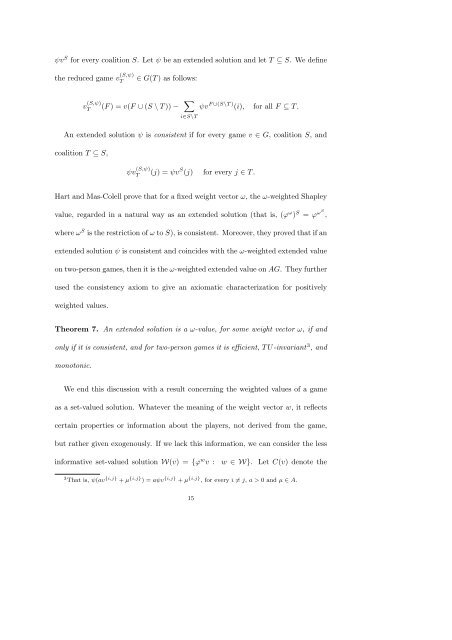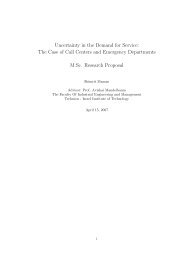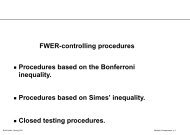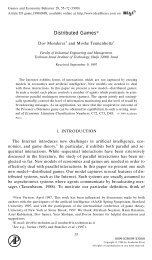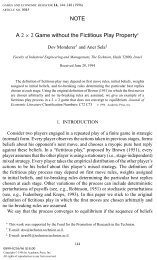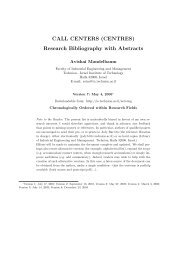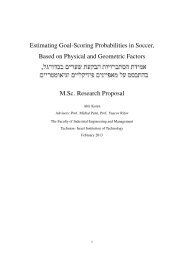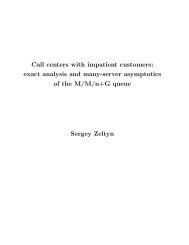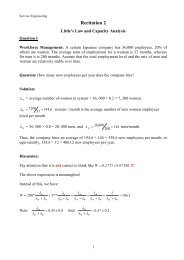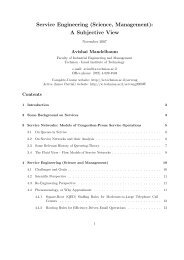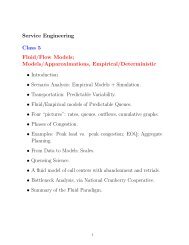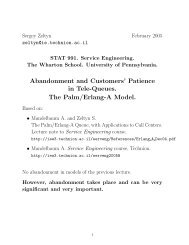Variations on the Shapley value
Variations on the Shapley value
Variations on the Shapley value
Create successful ePaper yourself
Turn your PDF publications into a flip-book with our unique Google optimized e-Paper software.
ψv S for every coaliti<strong>on</strong> S. Let ψ be an extended soluti<strong>on</strong> and let T ⊆ S. We define<br />
<strong>the</strong> reduced game v (S,ψ)<br />
T<br />
∈ G(T ) as follows:<br />
v (S,ψ)<br />
T (F ) = v(F ∪ (S \ T )) − <br />
i∈S\T<br />
ψv F ∪(S\T ) (i), for all F ⊆ T .<br />
An extended soluti<strong>on</strong> ψ is c<strong>on</strong>sistent if for every game v ∈ G, coaliti<strong>on</strong> S, and<br />
coaliti<strong>on</strong> T ⊆ S,<br />
ψv (S,ψ)<br />
T (j) = ψv S (j) for every j ∈ T .<br />
Hart and Mas-Colell prove that for a fixed weight vector ω, <strong>the</strong> ω-weighted <strong>Shapley</strong><br />
<strong>value</strong>, regarded in a natural way as an extended soluti<strong>on</strong> (that is, (ϕω ) S = ϕωS ,<br />
where ω S is <strong>the</strong> restricti<strong>on</strong> of ω to S), is c<strong>on</strong>sistent. Moreover, <strong>the</strong>y proved that if an<br />
extended soluti<strong>on</strong> ψ is c<strong>on</strong>sistent and coincides with <strong>the</strong> ω-weighted extended <strong>value</strong><br />
<strong>on</strong> two-pers<strong>on</strong> games, <strong>the</strong>n it is <strong>the</strong> ω-weighted extended <strong>value</strong> <strong>on</strong> AG. They fur<strong>the</strong>r<br />
used <strong>the</strong> c<strong>on</strong>sistency axiom to give an axiomatic characterizati<strong>on</strong> for positively<br />
weighted <strong>value</strong>s.<br />
Theorem 7. An extended soluti<strong>on</strong> is a ω-<strong>value</strong>, for some weight vector ω, if and<br />
<strong>on</strong>ly if it is c<strong>on</strong>sistent, and for two-pers<strong>on</strong> games it is efficient, T U-invariant 3 , and<br />
m<strong>on</strong>ot<strong>on</strong>ic.<br />
We end this discussi<strong>on</strong> with a result c<strong>on</strong>cerning <strong>the</strong> weighted <strong>value</strong>s of a game<br />
as a set-<strong>value</strong>d soluti<strong>on</strong>. Whatever <strong>the</strong> meaning of <strong>the</strong> weight vector w, it reflects<br />
certain properties or informati<strong>on</strong> about <strong>the</strong> players, not derived from <strong>the</strong> game,<br />
but ra<strong>the</strong>r given exogenously. If we lack this informati<strong>on</strong>, we can c<strong>on</strong>sider <strong>the</strong> less<br />
informative set-<strong>value</strong>d soluti<strong>on</strong> W(v) = {ϕ w v : w ∈ W}. Let C(v) denote <strong>the</strong><br />
3 That is, ψ(av {i,j} + µ {i,j} ) = aψv {i,j} + µ {i,j} , for every i = j, a > 0 and µ ∈ A.<br />
15


